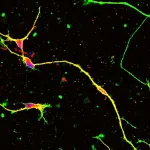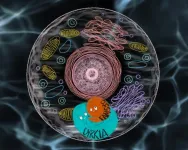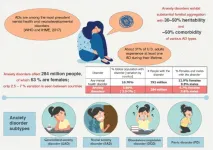(Press-News.org) AI models in health care are a double-edged sword, with models improving diagnostic decisions for some demographics, but worsening decisions for others when the model has absorbed biased medical data.
Given the very real life and death risks of clinical decision-making, researchers and policymakers are taking steps to ensure AI models are safe, secure and trustworthy—and that their use will lead to improved outcomes.
The U.S. Food and Drug Administration has oversight of software powered by AI and machine learning used in health care and has issued guidance for developers. This includes a call to ensure the logic used by AI models is transparent or explainable so that clinicians can review the underlying reasoning.
However, a new study in JAMA finds that even with provided AI explanations, clinicians can be fooled by biased AI models.
“The problem is that the clinician has to understand what the explanation is communicating and the explanation itself,” said first author Sarah Jabbour, a Ph.D. candidate in computer science and engineering at the College of Engineering at the University of Michigan.
The U-M team studied AI models and AI explanations in patients with acute respiratory failure.
“Determining why a patient has respiratory failure can be difficult. In our study, we found clinicians baseline diagnostic accuracy to be around 73%,” said Michael Sjoding, M.D., associate professor of internal medicine at the U-M Medical School, a co-senior author on the study.
“During the normal diagnostic process, we think about a patient’s history, lab tests and imaging results, and try to synthesize this information and come up with a diagnosis. It makes sense that a model could help improve accuracy.”
Jabbour, Sjoding, co-senior author, Jenna Wiens, Ph.D., associate professor of computer science and engineering and their multidisciplinary team designed a study to evaluate the diagnostic accuracy of 457 hospitalist physicians, nurse practitioners and physician assistants with and without assistance from an AI model.
Each clinician was asked to make treatment recommendations based on their diagnoses. Half were randomized to receive an AI explanation with the AI model decision, while the other half received only the AI decision with no explanation.
Clinicians were then given real clinical vignettes of patients with respiratory failure, as well as a rating from the AI model on whether the patient had pneumonia, heart failure or COPD.
In the half of participants who were randomized to see explanations, the clinician was provided a heatmap, or visual representation, of where the AI model was looking in the chest radiograph, which served as the basis for the diagnosis.
The team found that clinicians who were presented with an AI model trained to make reasonably accurate predictions, but without explanations, had their own accuracy increase by 2.9 percentage points. When provided an explanation, their accuracy increased by 4.4 percentage points.
However, to test whether an explanation could enable clinicians to recognize when an AI model is clearly biased or incorrect, the team also presented clinicians with models intentionally trained to be biased— for example, a model predicting a high likelihood of pneumonia if the patient was 80 years old or older.
“AI models are susceptible to shortcuts, or spurious correlations in the training data. Given a dataset in which women are underdiagnosed with heart failure, the model could pick up on an association between being female and being at lower risk for heart failure,” explained Wiens.
“If clinicians then rely on such a model, it could amplify existing bias. If explanations could help clinicians identify incorrect model reasoning this could help mitigate the risks.”
When clinicians were shown the biased AI model, however, it decreased their accuracy by 11.3 percentage points and explanations which explicitly highlighted that the AI was looking at non-relevant information (such as low bone density in patients over 80 years) did not help them recover from this serious decline in performance.
The observed decline in performance aligns with previous studies that find users may be deceived by models, noted the team.
“There’s still a lot to be done to develop better explanation tools so that we can better communicate to clinicians why a model is making specific decisions in a way that they can understand. It’s going to take a lot of discussion with experts across disciplines,” Jabbour said.
The team hopes this study will spur more research into the safe implementation of AI-based models in health care across all populations and for medical education around AI and bias.
Paper cited: “Measuring the Impact of AI in the Diagnosis of Hospitalized Patients: A Randomized Survey Vignette Multicenter Study.” JAMA
END
Clinicians could be fooled by biased AI, despite explanations
U-M study shows that while accurate AI models improved diagnostic decisions, biased models led to serious declines
2023-12-19
ELSE PRESS RELEASES FROM THIS DATE:
Measuring the impact of AI in the diagnosis of hospitalized patients
2023-12-19
About The Study: Although standard artificial intelligence (AI) models improve diagnostic accuracy, systematically biased AI models reduced diagnostic accuracy, and commonly used image-based AI model explanations did not mitigate this harmful effect in this multicenter randomized clinical vignette survey study involving hospitalist physicians, nurse practitioners, and physician assistants from 13 states.
Authors: Michael W. Sjoding, M.D., of the University of Michigan Medical School, and Jenna Wiens, Ph.D., of the University of Michigan, Ann Arbor, are the corresponding authors.
To ...
Disparities in preoperative goals of care documentation in veterans
2023-12-19
About The Study: In this study of 13,000 patients, few patients undergoing surgical procedures completed preoperative life-sustaining treatment documentation, with disparities in documentation rates based on race, ethnicity, rurality of patient residence, history of mental health disability, and access to high-volume facilities within a Veterans Affairs cohort.
Authors: Adela Wu, M.D., of the U.S. Department of Veterans Affairs, in Palo Alto, California is the corresponding author.
To access the embargoed study: Visit our For The Media website at this link https://media.jamanetwork.com/
(doi: ...
Screening for social determinants of health during primary care and emergency department encounters
2023-12-19
About The Study: This study found that patients screened in the emergency department (ED) were more likely to screen positive for Social Determinants of Health (SDOH) needs, which is not surprising given utilization patterns. Patients with SDOH needs have limited health care access and are more likely to use the ED than primary care. Although primary care–based screening found lower SDOH needs relative to the ED, primary care may be better optimized to follow and ultimately address SDOH needs.
Authors: Stacie ...
Study uncovers major hidden human-driven bird extinctions
2023-12-19
Humans have wiped out around 1,400 bird species – twice as many as previously thought – with major implications for the ongoing biodiversity crisis, a new study has found.
Many of the world’s islands were previously untouched paradises, but the arrival of people to places like Hawaii, Tonga and the Azores led, over time, to far-reaching impacts including deforestation, overhunting and the introduction of invasive species. Consequently, bird species were wiped out.
While the demise of many birds since the 1500s has been recorded, our knowledge of the fate of species before this relies on fossils, ...
Promising new treatment for a common hereditary nerve disease
2023-12-19
Researchers from Tokyo Medical and Dental University (TMDU) develop a genome-editing technique that reduces disease-causing proteins and related issues in cells from a patient with Charcot–Marie–Tooth disease type 1A
Tokyo, Japan – Scientific advances in the last century have changed our world significantly. For example, the world of genetics has opened doors to a myriad of possibilities: augmented human capabilities, cures for diseases, and even changes to the course of evolution.
In a study published last month in Communications Medicine, researchers from Tokyo Medical and Dental University (TMDU) have unveiled a groundbreaking genome-editing technique. This ...
Moderation surpasses excess
2023-12-19
Kyoto, Japan -- Down syndrome, a congenital disorder stemming from abnormal cell division and differentiation, is most common in newborns fated to neurodevelopmental delays and other health complications.
The genetic defect causes the dysfunction of the protein kinase DYRK1A, which is encoded on chromosome 21 and is deeply associated with both Down syndrome and autism spectrum disorder. DYRK1A has attracted attention as a target molecule for treating various diseases, but specific cellular mechanisms regulating ...
Linking genes and brain circuitry in anxiety disorders
2023-12-19
Kyoto, Japan – December 2023
Anxiety disorders (ADs) affect more than 280 million people worldwide, making them one of the most common mental health conditions. ADs have a genetic basis as seen from inheritance in families, and people with one subtype of AD tend to have another subtype, suggesting a shared genetic basis. Although the brain circuitry involved in ADs has been identified, its link with gene expression remains unclear. Two researchers at Kyoto University in Japan set out to uncover this link and found two gene clusters expressed in ...
A bacterial toolkit for colonizing plants
2023-12-19
Using a novel experimental approach, Max Planck researchers have discovered a core set of genes required by commensal bacteria to colonize their plant hosts. The findings may have broad relevance for understanding how bacteria establish successful host–commensal relationships.
Plants are colonized by an enormous variety of microorganisms, including bacteria, archaea and fungi, that form complex communities, or microbiomes, on their roots and organs. Although invisible to the naked eye, the importance of these tiny inhabitants should not be underestimated. They play a crucial role in plant nutrition, influence the health of plants, strengthen their tolerance to stress factors such as ...
Study provides new insight into low social determinants of health screening rates
2023-12-19
A new study provides the latest data on the low rates for screening and documenting Social Determinants of Health (SDOH) in healthcare settings.
SDOHs are a person's social, environmental and economic conditions highly correlated with their health outcomes. This includes unemployment, homelessness and illiteracy, among many other factors. Although SDOHs can contribute to a more comprehensive understanding of a patient's health and inform important policy changes, clinical offices fall short of tracking this information.
To better understand ...
FlexTech: A new era in flexible electronics research
2023-12-19
On December 9, 2023, the 5th International Conference on Flexible Electronics (ICFE 2023) was held in Hangzhou, China. The international academic journal, FlexTech, was officially inaugurated at this conference.
FlexTech is an initiative led by Tsinghua University, with academic support from the Laboratory of Flexible Electronics Technology Laboratory, Tsinghua University. This journal is co-published by Tsinghua University Press and John Wiley & Sons, Inc.
The editorial board of FlexTech is under the distinguished leadership of Professor Xue ...
LAST 30 PRESS RELEASES:
Novel camel antimicrobial peptides show promise against drug-resistant bacteria
Scientists discover why we know when to stop scratching an itch
A hidden reason inner ear cells die – and what it means for preventing hearing loss
Researchers discover how tuberculosis bacteria use a “stealth” mechanism to evade the immune system
New microscopy technique lets scientists see cells in unprecedented detail and color
Sometimes less is more: Scientists rethink how to pack medicine into tiny delivery capsules
Scientists build low-cost microscope to study living cells in zero gravity
The Biophysical Journal names Denis V. Titov the 2025 Paper of the Year-Early Career Investigator awardee
Scientists show how your body senses cold—and why menthol feels cool
Scientists deliver new molecule for getting DNA into cells
Study reveals insights about brain regions linked to OCD, informing potential treatments
Does ocean saltiness influence El Niño?
2026 Young Investigators: ONR celebrates new talent tackling warfighter challenges
Genetics help explain who gets the ‘telltale tingle’ from music, art and literature
Many Americans misunderstand medical aid in dying laws
Researchers publish landmark infectious disease study in ‘Science’
New NSF award supports innovative role-playing game approach to strengthening research security in academia
Kumar named to ACMA Emerging Leaders Program for 2026
AI language models could transform aquatic environmental risk assessment
New isotope tools reveal hidden pathways reshaping the global nitrogen cycle
Study reveals how antibiotic structure controls removal from water using biochar
Why chronic pain lasts longer in women: Immune cells offer clues
Toxic exposure creates epigenetic disease risk over 20 generations
More time spent on social media linked to steroid use intentions among boys and men
New study suggests a “kick it while it’s down” approach to cancer treatment could improve cure rates
Milken Institute, Ann Theodore Foundation launch new grant to support clinical trial for potential sarcoidosis treatment
New strategies boost effectiveness of CAR-NK therapy against cancer
Study: Adolescent cannabis use linked to doubling risk of psychotic and bipolar disorders
Invisible harms: drug-related deaths spike after hurricanes and tropical storms
Adolescent cannabis use and risk of psychotic, bipolar, depressive, and anxiety disorders
[Press-News.org] Clinicians could be fooled by biased AI, despite explanationsU-M study shows that while accurate AI models improved diagnostic decisions, biased models led to serious declines




